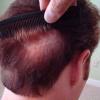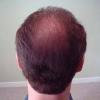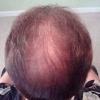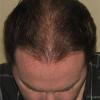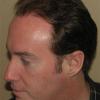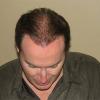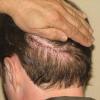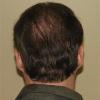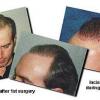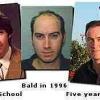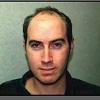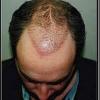About
I started losing my hair in my mid twenties. I tried minoxidil and other topical treatments but my hairline kept receding and my hair got thinner on top. I then wore a "hair stystem" for several years but this always felt phony.
Finally, I found Dr. Ron Shapiro in 1996 and after 3 sessions of about 1,500 grafts each I was able to get completely out from under my hair system. It was very liberating to have a completely natural look that was my own naturally growing hair again.
More recently, November of 2004, I had Dr. Paul Rose in Tampa Florida add about 1,000 grafts in my crown area, which over time had continued to thin. This new hair has now grown in and helped add fullness and shape to me crown area.
On November 21st of 2006 (ten years after my first hair transplant) I did another session of 1,631 grafts (3,902 hairs) with Dr. Ron Shapiro.
My Surgical Treatments to Date
Three session of about 1,500 follicular unit grafts with Dr. Ron Shapiro from 1996 to 1998. An additional 1,000 grafts with Dr. Paul Rose in Tampa, Florida. Then a session of 1,631 grafts (3,902 hairs) in November of 2006.
My Non Surgical TreatmentsPast - Hair System and Rogaine
Current - Propecia and some "Prothik" hair thickening spray to add fullness and density to my hair on top.
Bald Class

Norwood stage 5A
In stage 5A, the hairline continues to progress toward the back of the head.
When I first started noticing my hair thinning and beginning to recede at around age 24 I felt cheated of my youth. I knew that at the rate I was thinning I was fast heading for a serverly receding hairline or worse yet - bald well before age 30. And at that time there weren't any real hair loss treatments. Even Rogaine had not been FDA approved and there was no Propecia. Hair transplants also were outrageously expensive - as much as $25 to $35 per graft for plugs and minis.
At first I tried hair loss treatments like prescription Minoxidil (before the days of over the counter Rogaine). But after a few months I noticed no improvements and I didn't like how it made my scalp goopy and itchy. So I quit using Rogaine and my hair loss really took off.
Given these realities I found my hair loss a constant losingbattle, which was very depressing. It was like a constant cloud that followed me every where.
Given so few options at the time for restoring my own real hair I started wearing a hair piece. It could look natural. But it took lots of care and I was always worried about the wind, nephews and nieces pulling on my hair and girl friends who might do the same. I wore "hair systems" for about seven years. But wearing a hair system made me increasingly feel phony and neurotic.
But then in the late nineties I took a new look at hair transplants and found that it had come a long way from plugs and mini grafts. With the advent of follicular unit hair transplantation it had finally became a viable and natural option.
After three sessions of about 1,500 grafts each I was able to restore a natural looking and relatively full look in the hairline and midscalp regions. Once all these new hairs had grown in I was able to trash my last hair piece, which was very liberating.
The only treatment that actually restored my lost hair was hair restoration surgery. I was lucky to be among some of the first patients to get follicular unit hair transplantation when it was emerging as the new "gold standard" in hair restoration surgery. Dr. Ron Shapiro was one of the true pioneers of this technique and he also had an excellent eye for creating very natural hairline and distribution.
I also take Propecia as insurance against further hair loss. Propecia has not restored any of the hair I lost but it may be keeping me from losing more.
I'm very glad I did hair transplantation. It was like rolling back time and in many ways it felt like regaining my lost youth. Of course, I'm now so used to having my hair and not worrying about losing it that I now take it for granted.
But when I read posts on our hair loss forum from new patients who are so excited to have new hair growing in it reminds me of how exciting it was to actually beat hair loss - finally.
For those who have already lost considerable hair, a hair transplant is really the only option for getting that hair back in the hairline. The key is to only do surgery with a truly excellent and ethical hair restoration clinic that is taking the time and effort to do it right.
I've spent years attending international hair transplant meetings and workshops and visiting dozens of leading clinics worldwide to gather information about what is truly state of the art and who is doing such hair transplantation with excellent results. Only those surgeons who I believe are doing competent and state of the art hair transplantation are presented on our educational websites. These leading surgeons are presented at www.HairTransplantNetwork.com
I suggest that a potential patient do plenty of research to determine if hair transplantation is right for them and if so who is the best clinic for them. I strongly suggest that patients be open to traveling to get the absolute best results, which will last a life time. Many patients now travel to get the very best results.
For those who are younger and losing hair I suggest they get a prescription for Propecia to slow or halt hair loss, whether they do hair transplants or not. As for the rest of the "treatments" I think they are marginal at best and often down right snake oil more than not.
It was great for my moral. This positive experience also led me to share my story on the Internet back in the late nineties with a simple looking site that I put together myself. In time this site evolved into a true online community - the Hair Transplant Network at www.HairTransplantNetwork.com - that has helped hundreds of people learn how to also restore their own real hair.
This community has also helped truly excellent hair transplant surgeons get the recognition and patients they deserve.
Helping people find great surgeons and restore their hair has been my full time work for well over five years now. I've truly turned my lemon into my lemonade. It feels good to know that I took a negative and turned it into a positive for not only me but hundreds if not thousands of other hair loss sufferers. So for me, surgery has changed my life in many positive ways.
Don't despair! There really is hope for restoring your hair. Me and hundreds of other people are living proof of this.
But one must be careful - even today. Yes, how to do great hair transplants is no longer a secret. But unfortunately many if not most hair transplant surgeons still take too many short cuts that save time and money at the expense of patient results. The key is to go only to those clinics who really care about patients more than money (i.e. high volume, short cuts, minimal staff and equipment, speed rather than taking the time to optimize the surgery etc.)
Before choosing a surgeon I strongly suggest using the "Find" feature on our discussion forum to search for posts about this surgeon going back 5 years. Tens of thousands of posts have been made about surgeons on our forum over the past 5 years by people and patients with first hand experience. This is an incredible resource. Please use it.
Also feel free to post your questions and concerns on our forum. Normally you will get plenty of constructive replies to your question from very helpful people who are also hair loss sufferers.
With enough information and knowledge you will be both able and comfortable in restoring your own real hair. We're here for you.
Best wishes for restoring your hair too.
Patrick Hennessey, Publisher of the www.HairTransplantNetwork.com, www.HairLossLearingCenter.org and www.HairRestorationNetwork.com

 Elite Coalition Member
Elite Coalition Member


